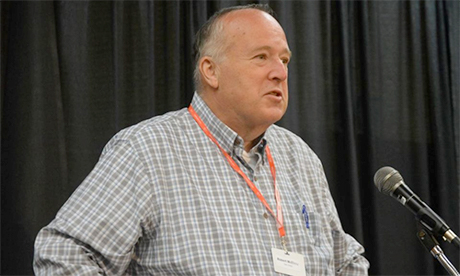The “lived reality of men and women and children and families” and their “sufferings and challenges and joys” are at the center of “a moment of explicit theological renewal that will contribute enormously to the spread of the Gospel in this new millennium,” said San Diego Bishop Robert McElroy (pictured) in a June 26 keynote address.
That understanding of the “emerging pastoral theology” delineated and promoted by Pope Francis “both links us to the pastoral action and ethos of the Lord himself” and is “highly attuned to the challenges and culture of the 21st century,” McElroy told participants at the annual assembly of the Association of U.S. Catholic Priests (AUSCP) held June 25-28 in Albuquerque, New Mexico.
McElroy declared the “see-judge-act methodology” that undergirds this understanding of pastoral theology “is rooted in the world as it is, rather than in the world as it is imagined to be.”
“The pastoral theology of Pope Francis,” he said, “rejects a notion of law which can be blind to the uniqueness of concrete human situations, human suffering and human limitation.”
Titled “Pastoral Theology for a Post-Modern World,” the address drew a sustained standing ovation. McElroy exhorted Catholics to:
- Banish “judgmentalism from the life of the church, and replace it with the constantly affirming love of Jesus Christ”;
- Embrace the principle that “lived experience of human sinfulness and human conversion are vital to understanding the central attribute of God in relation to us, which is mercy”;
- Realize that “the pastoral theology of Pope Francis requires that the liturgical and sacramental life of the church be formed in compassionate embrace with the often overwhelming life-challenges which prevent men and women at periods of their lives from conforming adequately with important Gospel challenges.”
The bishop drew an audible reaction from the more than 200 AUSCP participants when he said that while opponents of “elements of the pastoral mission of Pope Francis” often argue that “doctrine cannot be superseded by the pastoral,” it is “equally important to recognize that the pastoral cannot by eclipsed by doctrine.”
“And pastoral authority is as important as philosophical authenticity or authenticity in law contouring the life of the church to the charter which our Lord himself has given us,” he said.
In “enormously important ways, the vision of pastoral theology embraced by Pope Francis is a rejection of the tradition which sees pastoral theology as primarily derivative,” McElroy said. Continue reading
- Image: NCR
News category: Features.




